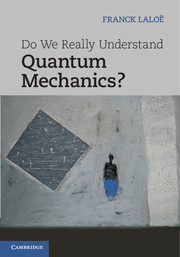Book contents
- Frontmatter
- Contents
- Foreword
- Preface
- 1 Historical perspective
- 2 Present situation, remaining conceptual difficulties
- 3 The theorem of Einstein, Podolsky, and Rosen
- 4 Bell theorem
- 5 More theorems
- 6 Quantum entanglement
- 7 Applications of quantum entanglement
- 8 Quantum measurement
- 9 Experiments: quantum reduction seen in real time
- 10 Various interpretations
- 11 Annex: Basic mathematical tools of quantum mechanics
- Appendix A Mental content of the state vector
- Appendix B Bell inequalities in non-deterministic local theories
- Appendix C An attempt for constructing a “separable” quantum theory (non-deterministic but local)
- Appendix D Maximal probability for a state
- Appendix E The influence of pair selection
- Appendix F Impossibility of superluminal communication
- Appendix G Quantum measurements at different times
- Appendix H Manipulating and preparing additional variables
- Appendix I Correlations in Bohmian theory
- Appendix J Models for spontaneous reduction of the state vector
- Appendix K Consistent families of histories
- References
- Index
Appendix A - Mental content of the state vector
Published online by Cambridge University Press: 05 September 2012
- Frontmatter
- Contents
- Foreword
- Preface
- 1 Historical perspective
- 2 Present situation, remaining conceptual difficulties
- 3 The theorem of Einstein, Podolsky, and Rosen
- 4 Bell theorem
- 5 More theorems
- 6 Quantum entanglement
- 7 Applications of quantum entanglement
- 8 Quantum measurement
- 9 Experiments: quantum reduction seen in real time
- 10 Various interpretations
- 11 Annex: Basic mathematical tools of quantum mechanics
- Appendix A Mental content of the state vector
- Appendix B Bell inequalities in non-deterministic local theories
- Appendix C An attempt for constructing a “separable” quantum theory (non-deterministic but local)
- Appendix D Maximal probability for a state
- Appendix E The influence of pair selection
- Appendix F Impossibility of superluminal communication
- Appendix G Quantum measurements at different times
- Appendix H Manipulating and preparing additional variables
- Appendix I Correlations in Bohmian theory
- Appendix J Models for spontaneous reduction of the state vector
- Appendix K Consistent families of histories
- References
- Index
Summary
(i)Arelatively recent (1999) article by Englert, Scully, andWalther [85] provides an interesting illustration of the debate about the content of the state vector, in particular because of the wording chosen by the authors. Speaking of standard theory, they write: “(One) is led astray by regarding state reductions as physical processes, rather than accepting that they are nothing but mental processes”. They then advocate a “minimalistic interpretation of state vectors” and actually even give a general warning that it is dangerous to go beyond it (“Van Kampen's caveat”), but do not expand very much on these dangers. It is then interesting to extend this line of thought further: if the state vector can evolve under the effect of a “purely mental process”, it then necessarily acquires elements that are mental (subjective), instead of being related to external reality only (objective). The Schrödinger evolution, on the other hand, is determined by external macroscopic parameters, and therefore has a reality content that is similar with these parameters. Should we consider that the state vector is hybrid, and combines elements describing external reality, at least partially, and others that are purely mental, all contained in a single mathematical object? In this view, the process of state vector reduction would correspond to times when the state vector suddenly acquires more mental elements (since the reduction process is considered as purely mental); the Schrödinger evolution would correspond to periods of time where the mental content remains constant.
- Type
- Chapter
- Information
- Do We Really Understand Quantum Mechanics? , pp. 328 - 329Publisher: Cambridge University PressPrint publication year: 2012



